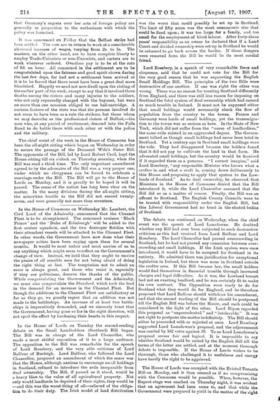Lord Rosebery, in a speech of very remarkable force and
eloquence, said that he could not vote for the Bill for the very good reason that he was supporting the English Small Holdings Bill. The principles of the two Bills were destructive of one another. If one was right the other was wrong. There was no reason for treating Scotland differently from England, and there was still less reason for imposing on Scotland the fatal system of dual ownership which had caused so much trouble in Ireland. It must not be supposed either that small holdings would necessarily check the flow of population from the country to the towns. France and Germany were lands of small holdings, yet the transmigrm tion to the towns was as serious as here. In the State of New York, which did not suffer from the "curse of landlordism," the same evils existed in an aggravated degree. The Govern. ment talked as though small holdings had never been tried in Scotland. Yet a century ago in Scotland small holdings were the rule. They had disappeared because the holders found that it did not pay to cultivate the land in that form. He advocated small holdings, but the country would be deceived if it regarded them as a panacea. "I cannot imagine," said Lord Rosebery, "any responsible Minister who knows what a crofter is, and what a croft is, coming down deliberately to this House and proposing to apply that system to the Low-- lands of Scotland." As to dual ownership, he observed that Ministers in the House of Commons denied that the Bill introduced it, while the Lord Chancellor assumed that the Bill did so as a matter of course. Finally, the Bill was an affront to Scotland. The English County Councils were to be trusted with responsibility under the English Bill, but this Liberal Government had no trust in the elected bodies of Scotland.


































 Previous page
Previous page